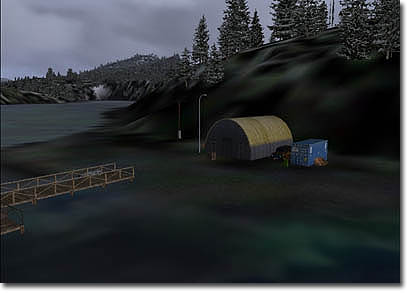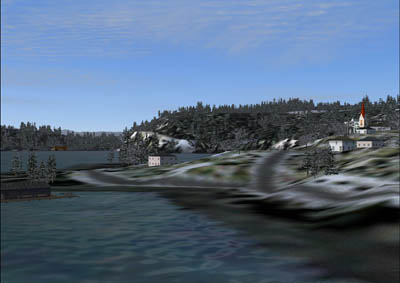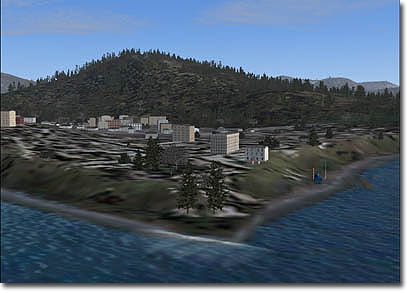The
Misty Moorings FSE Project is a collection of scenery
items for several seaplane bases in south-east Alaska.
The intent was to create a bit more life in these areas,
not to duplicate real world conditions. If realism is
what you are looking for, this package may not be for
you.
Some locations have
small enhancements while others are more complex. All areas make use of
seasonal and/or time of day changes and a few locations even have
animation. Hopefully, you will find flying over or into these areas more
enjoyable.
This package is
designed for use with Misty Fjords from Holger Sandmann and FSAddon. The
scenery items in this package are mostly coastal
and designed with 'terrain_max_vertex_level'
set to 20. Anything less could result in objects not appearing to be
placed properly. (see the Misty Fjords manual
for more information).
Scenery sounds make
use of additional add-on sound packs so if you experience little or no
sound in an area, it's possible that your FSE
sound library do not have the needed files. You can find additional sound
packages at:
If you do not wish to
download additional sound files, feel free to make your own sound edit
using the default library.
Dan Wambolt
dcwambolt@hotmail.com
|
|
Loring was the site of a saltery in the early 1900s. Soon after, a cannery was
built and a few small cabins / homes were constructed to house the
employees. The cannery shut down in 1930 but remains are still visible.
Today, the
seaplane base at Loring is closed but it
remains an active community and recreational destination.
Across the bay, you
will find John Tillman's business. For 50 years, John has built some of
the best wooden boat hulls in south-east Alaska. Even if you don't have to
bring in new supplies for John or transport a customer, drop by for
coffee or his wife's famous corn bread.
On
Dogfish Island,
an abandoned communication tower still remains.
|

|
|
Yes Bay lies
fifty miles north of Ketchikan and
is fed from the Behm Canal.
It's one of the state's premier saltwater angling locations. The famous
Yes Bay Lodge is nearby overlooking Wolverine Creek.
Long before the area
became a popular destination, Noel Fraser operated a
bait and tackle shop a few hundred yards north of the Lodge and
water runway. The business is still open but most of his time is spent on
wood carvings that he sells to the Lodge's gift shop.
Drop by to see Noel
sometime. He can tell you some of the best fishing tales ever to come out
of Alaska.
He's also likely to show you some of the wooden projects he's been
working on.
|

|
|
Bell Island Hot
Springs has
seen great revitalization projects. Cabins dating back to the late 1800's
are being brought back to life and new construction is underway to feed
the surge in tourism. In it's heyday, Bell
Island was a favorite getaway for
the wealthy including John Wayne and Henry Fonda.
In a nearby cove,
you'll find the operations outpost for Northern Preservation, a
construction company specializing in environment-friendly rebuilding
projects. If you have a private float plane business, you may want to pay
them a visit. Almost all of their transportation needs are met by private
water and air operators.
|

|
|
Thorne Bay developed as a result of a
long-term timber sales contract between the U.S. Forest Service and the
Ketchikan Pulp Company. A floating logging camp was built in the bay and
eventually replaced the facilities in Hollis. Located 40 miles northwest
of Ketchikan
on Prince of Whales Island, it was named after Frank Manley Thorne,
superintendent of the U.S. Coast & Geodetic Survey from 1885 through
1889.
Only a small section
of the old floating camp remains and can be found anchored near the town
shoreline.
A few hundred yards
south is the old Clydesdale Farm. Up until the 60's, Sebastian Munroe
bred and raised many Clydesdale horses that were needed during the early
1900s for logging and farming. The farm is now vacant but remains the
property of a descendant, now living in Ketchikan. Once a month,
Elizabeth charters a flight to
Thorne Bay
to check on the property.
|

|
|
Hollis sits on the east side of Prince of Wales Island on Twelvemile
Arm. With a population of about 140 non-natives, most employment is
provided through logging operations, state ferry services and the U.S.
Forest Service. It is also the location of the state ferry landing for Prince of Wales Island
On the small
peninsula, there is a machine shop for ferry maintenance and several
docks for boat and floatplane activities. For a small fee, the operation
will cater to light metal fabrication and light engine repair for
non-ferry business.
Klawock is only 20 miles northwest of
Hollis.
|

|
|
Hydaburg is approximately 20 miles
Southwest of Hollis. It was founded in 1911 when several Haida village elders decided to consolidate for
better educational opportunities. Over the years, fish processing plants
opened and closed but it's heritage has remained
strong. Hydaburg is well-known for itís historical carvings in their
Totem Park.
|

|
|
Klawock was home to the first Salmon
cannery in 1878 that started the Alaska Salmon Industry. Although several
have tried, only one cannery remained successful through history. Today,
the community owned cannery, Southeast Seafoods)
is the dominant feature on the waterfront.
If you fly over, be
sure to look for the strong logging presence that evolved since the 70s.
Clear-cutting and reforestation are visible although many logging
activities scale back in the winter. For small and medium size
wheeled aircraft, there is a paved airstrip two miles northeast of the
town.
|

|
|
Kasaan gets its name from the Tlingit
word meaning "pretty town." Since the early 1900's, canneries
have come and gone (many destroyed by fire) but today, few of the
original buildings remain. Most villagers (both native and non-native)
participate in subsistence or recreational activities for food sources,
harvesting deer, salmon, halibut, shrimp and crab.
Population is less
than 100 and there isn't much transient traffic these days. Occasionally,
visitors include government officials or tribal elders. A dock is
available, used mostly by small vessels looking to refuel (diesel and
gasoline only) or make repairs.
|

|
Back
to Misty Moorings Home Page
|